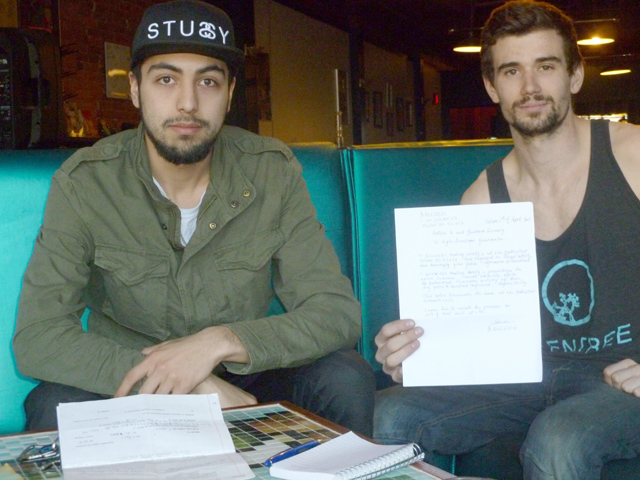New Compassion Club gets the Heave Ho — Again
For the second time since it arrived in Nelson last fall, the Qunnabu Healing Society’s (QHS) Medical Marijuana Compassion Club has been evicted from its storefront.
“We’re trying to bring alternatives to people so they have a choice, like if you walk into any other store,” said society director Kyle Lindroos.
But things haven’t gone so well, as they did in Vancouver for Lindroos where there are more than 65 compassion clubs. Lindroos, a firefighter from Ontario, had been working with the Vancouver clubs for three years when he decided to come to Nelson to provide the same service.
He helped form the QHS, a non-profit society incorporated in October, 2014, and opened the 420 Vape Lounge in the Front Street Emporium — 601 Front Street — in what used to be Strutters Clothes in September.
According to Lindroos, providing medical marijuana to those who had obtained a doctor’s note and met QHS requirements was going well until the Nelson Police Department stepped in to advise the landlord that what the QHS was doing was illegal and that the building’s insurance was at risk.
“It was complete subterfuge,” he said, noting that the eviction notice was given February 28 to be out March 31.
But NPD Deputy Chief Paul Burkart said what the police were doing was “educational.”
“We provided the landlords with our position, that with marijuana grows in house, their insurance could be null and void, and we let the owners of the buildings know this….we certainly were not harassing them.”
Lindroos said he was not growing marijuana at the storefronts.
And in fact, while some of the tenants in the Front Street Emporium did not take issue with the compassion club, manager Paula Snow said she began receiving complaints from other tenants.
“They couldn’t contain the smell, it was pervasive in the building,” she said. “ And we were told there would be no smoking on site. Yet they were vaporizing and there’s a very fine distinction as to whether that is smoking on the premises.”
One tenant moved out, she said. But the final straw was when another tenant became concerned and submitted a written letter detailing numerous complaints and concerns. Snow said she felt the possibility of losing a second long-term tenant in a 20-tenant building was too much of a risk.
“Yes, the police made us aware of their concerns, and I felt they were asking the landlord to do their business,” she said.
She also said she was told that the City of Nelson pulled the QHS business licence.
However, according to the city’s business licensing department, non-profits and charities do not need a business license, The Nelson Daily has learned.
Nonetheless, the QHS found a new location above the Dollar Store in the 600 Block of Baker Street for $2,600 per month and began to set up shop on April 1.
That lasted one week before the new landlord, Armand Olender, gave them a handwritten eviction notice.
“Qunnabu Healing Society has engaged in illegal activities and has knowingly given false information to landlord,” Olender wrote. “(QHS) is jeopardizing the owner business as well as adversely effects the Baker Street businesses….” he wrote on April 7.
Olender gave them until the April 20 to vacate the premises.
“I cannot share any details of the rental,” said Olender by phone. “The matter may end up in court.”
Several facts are complicating the issue.
One is that the courts have not ruled whether or not medical marijuana users can grow their own cannabis — as opposed to having other licenced growers supply them with it.
The new regulations (MMPR) that do not allow patients to grow their own are being challenged in the courts and as Burkart said: “We’re in limbo.”
“But,” he continued, “whatever the courts rule, which we expect in April or May, it will still be illegal to sell (marijuana) in a storefront.”
The new regulations provide for medical patients to order their cannabis from licenced growers who mail them the product.
However, Lindroos claims he is a licenced grower. With his license, he believes, he can legally sell to other patients. His specialty is edibles, which he said he could provide more affordably because there is no middleman.
As a medical marijuana user himself, he is determined “ to help people who can’t get access themselves.” Already, he says, the QHS has 100 members, and he expects that number to grow.
Patients anywhere from 18 years old to 75 years old have frequented his club.
Another factor is the cost to patients from licenced growers. Marijuana can cost them $100 per day. “These people are fully disabled, or with cancer. Who can afford this?” asked Lindroos.
Lindroos said he could cut costs because he manufactures edibles and grows affordable quality cannabis (www.nelson420.com).
From his standpoint there is one solution: “We just have to get the stigma away. We need a cease and desist order,” to allow him to provide medical marijuana to qualified patients.
He said he is considering civil action in the courts and is consulting Vancouver lawyers.






















